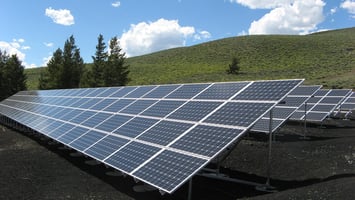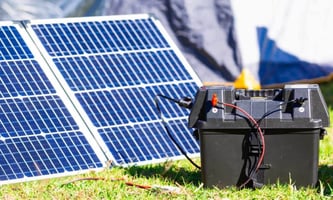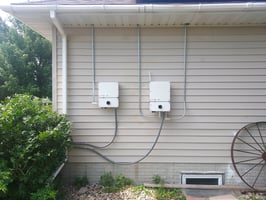If you’re considering investing in solar energy, one of your main questions is bound to be “how often do solar panels need to be replaced?”. Rest assured, like many leaps of faith into renewable energy, that answer can be incredibly encouraging.
Advancements in technology ensure residential solar panels last decades with minimal or no maintenance needed.
In this blog post, Wolf River Electric explores some key considerations about how long different types of photovoltaic (PV) technology will last and what factors could impact its performance over time. You’ll soon learn about solar panel replacement and why it’s likely worth it to invest in your home’s sustainability today
Average Solar Panel's Lifespan

The average lifespan of most solar panels is typically around 25 to 30 years. However, with proper maintenance and care, solar panels can continue to generate electricity beyond their expected lifespan.
Note that the efficiency of solar panels may gradually decrease over time, resulting in slightly reduced power output. Regular cleaning, monitoring, and occasional repairs or panel replacements can help maximize the lifespan and performance of solar panels, ensuring their long-term benefits as a reliable and sustainable source of energy.
Types Of Solar Panels And Their Lifespans

Monocrystalline Solar Panels: Monocrystalline panels, with a single crystal structure, provide high efficiency and a sleek look. These panels typically have a 25 to 30 years lifespan, with some solar panel manufacturers offering warranties of up to 25 years.
Polycrystalline Solar Panels: Polycrystalline panels are made from multiple silicon crystals, resulting in a slightly lower efficiency than monocrystalline panels. Their lifespan is similar to monocrystalline panels, typically 25 to 30 years.
Thin-Film Solar Panels: Thin-film panels are made by depositing a thin semiconductor layer onto a substrate. They have a different appearance and flexibility, allowing for various applications. Thin-film boards generally have a shorter lifespan, typically around 20 to 25 years.
Factors That Affect Solar Panel Lifespans

The lifespan of solar panels can be influenced by several factors, including the following:
Quality
High-quality panels from reputable manufacturers tend to have better durability and longer lifespans. Investing in panels with reliable solar panel warranties and certifications can provide assurance of their performance and longevity.
Installation
Poor solar panel installation practices, such as incorrect mounting, inadequate wiring, or improper sealing, can lead to issues over time. Hiring experienced and certified professionals to install the panels ensures they are correctly positioned, securely mounted, and wired to maximize efficiency and lifespan.
Maintenance
Cleaning the panels to remove dirt, debris, or bird droppings ensures optimal sunlight absorption. Periodic inspections to identify any damage, such as cracks or loose connections, allow for timely repairs. Additionally, monitoring the panels’ performance and promptly addressing any issues can help maintain efficiency and maximize lifespan. This plays a part in how often do solar panels need to be replaced.
Go Solar Today!
Signs It's Time To Replace Solar Panels
Old Age
Solar panel technology has improved over the years, and older panels may not be as efficient or reliable. Therefore, it is important to keep track of when a solar panel system was installed and consider replacing the panels if they are over 20-25 years old.
Physical Damage
Solar panels should be checked regularly for any physical damage. This could include broken glass or other visible defects that may have been caused by weather, animals, objects hitting the panel or other sources of stress. If any of these signs are present, the solar panel should be replaced as soon as possible in order to maintain optimal performance of the system.
Low Energy Output And Performance
Solar energy systems can begin to lose efficiency over time due to age, weather conditions or physical damage. To ensure that your system is operating efficiently and producing enough power for your needs, consider having an energy audit completed on a regular basis. If the audit indicates that your system is producing less power than expected or has become inefficient, it is time to replace your solar panels.
Discolored Surfaces
Solar panels are made of highly reflective material, which helps them collect sunlight and convert it into electrical energy. Over time, this reflective material can become discolored due to dirt and debris. If the solar panels are not cleaned regularly or if the discoloration is too serious, it could affect the performance of your system and should be replaced promptly.
Other Solar System Components Fail
Over time, other components in a solar energy system can fail such as the inverter, battery or wiring. If any of these components fail, they can cause a decrease in performance of your solar system and it may be necessary to replace them as well as the panels. This will ensure that your system is running at its peak efficiency and producing enough power for your needs.
Tips To Make Your Solar Panels Last Longer
Keep an eye on your usage
Use a reputable solar installer
Maintain and clean solar panel system
Use quality equipment
Contact Wolf River For Lasting Solar Power

Going Solar with Wolf River Electric has clear and lasting benefits to your energy bills and environmental impact. Wolf River can help you find the best solar installation to fit your individual needs. Furthermore, Wolf River Electric is a licensed solar company and guarantees professional service, quality materials, and clear communication that will meet the expectations of any customer.
Now that you know more about the advantages of solar power and how to get it from Wolf River, why wait? Get started on your path to clean energy produced in your backyard. And if you have any other questions about a solar power system, such as ‘how often do solar panels need to be replaced’, don’t worry: contact us at Wolf River for more guidance.
Frequently Asked Questions
Yes, solar panels can degrade over time due to a variety of factors such as extreme weather conditions and age. Sunlight UV rays, extreme temperatures, wind-borne debris, hail, and other environmental hazards can cause deterioration of the cells that comprise the panel, which could lead to a decrease in performance.
The life expectancy of solar panels is typically 25 to 30 years, depending on the technology used and the environmental conditions in which it is installed. Some high-quality solar panel systems can last longer than 30 years if properly maintained.
It is not necessary to replace solar panels unless they are significantly degraded and no longer producing the expected amount of energy. If you experience a noticeable decrease in output, then it could be a sign that your system needs to be serviced or replaced.
A full system replacement usually costs around $15,000 to $25,000. The exact cost will depend on various factors including the size of the system, type and quality of solar panel, and labor costs. You also need to factor in any applicable rebates or incentives that may be available when replacing your solar panels.
Join Our Solar Community
Get exclusive access to the latest solar news, tips, and promotions!


